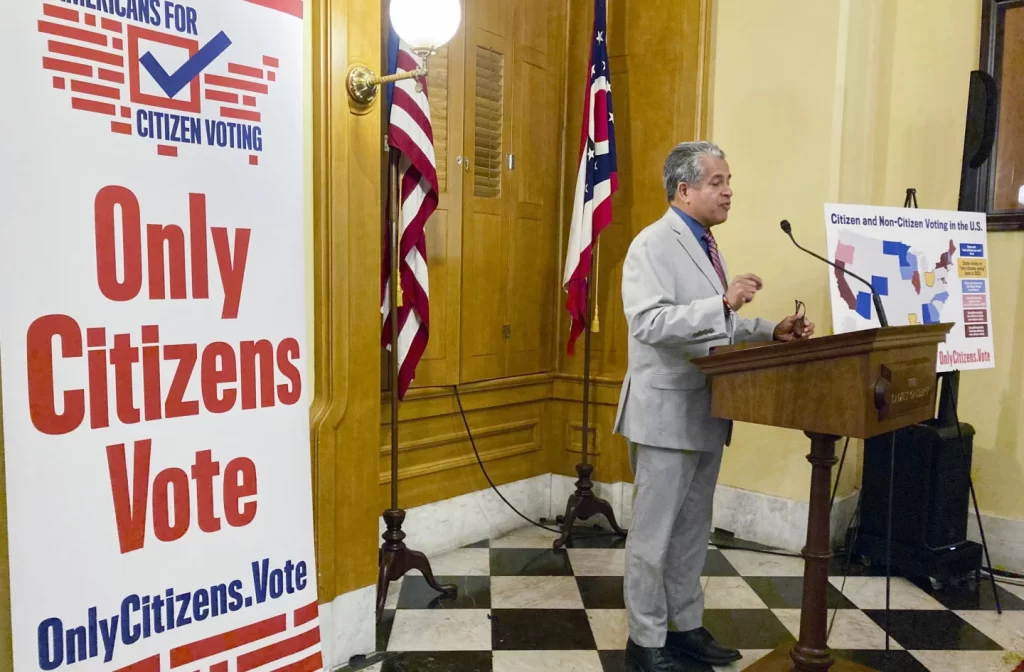
Only U.S. citizens are eligible to vote in this fall’s election for president and other top offices. While that is nothing new, the potential for noncitizens to register or vote has been receiving a lot of attention lately.
Citing an influx of immigrants in recent years at the U.S.-Mexico border, Republicans have raised concerns about the possibility that noncitizens will be voting and they have taken steps in numerous states to address that prospect, even though cases of noncitizens actually voting are rare.
GOP officials have undertaken reviews of voter rolls, issued executive orders and placed constitutional amendments on state ballots as part of an emphasis on thwarting noncitizen voting. Some Democrats contend the measures could create hurdles for legal voters, are unnecessary and lead people to believe the problem of noncitizens voting is bigger than it really is.
What does the law say?
A 1996 U.S. law makes it illegal for noncitizens to vote in elections for president or members of Congress. Violators can be fined and imprisoned for up to a year. They can also be deported.
When people register to vote, they confirm under penalty of perjury that they are U.S. citizens. Federal law requires states to regularly maintain their voter rolls and remove anyone who is ineligible, a process that could identify immigrants living in the country illegally.
No state constitutions explicitly allow noncitizens to vote, and many states have laws that prohibit noncitizens from voting for state offices such as governor or attorney general. But some municipalities in California, Maryland and Vermont, as well as the District of Columbia, do allow voting by noncitizens in some local elections such as for school board and city council.
What does the data say?
Voting by noncitizens is rare. Yet Republican officials have highlighted voter registration reviews that turned up potential noncitizens.
Texas Gov. Greg Abbott, a Republican, said this past week that more than 6,500 potential noncitizens have been removed from Texas voter rolls since 2021, including 1,930 with “a voter history” who have been referred for investigation by the attorney general’s office. Texas has almost 18 million registered voters.
Ohio Secretary of State Frank LaRose, a Republican, said in August that he referred for potential prosecution 138 apparent noncitizens found to have voted in a recent election and 459 more who registered but did not vote. Those figures were higher than reviews from previous years but a small fraction of the more than 8 million registered voters in Ohio.
Alabama Secretary of State Wes Allen, a Republican, recently announced that 3,251 people previously identified as noncitizens by the federal government are being switched to inactive status on the state’s voter registration rolls. They will be required to provide proof of citizenship and fill out a form to vote in November. Alabama has more than 3 million registered voters.
In Georgia, Republican Secretary of State Brad Raffensperger found that 1,634 potential noncitizens tried to register to vote between 1997 and 2022, though election officials flagged them and none was registered. Georgia registered millions of other voters during that time.
Some election administration experts have said the voter roll reviews show that current tools to flag noncitizen voters are working.
Arizona provides a case study for the long-running attempts by Republicans to prohibit noncitizen voting.Under a 2004 voter-approved initiative, Arizona required a driver’s license, birth certificate, passport or other similar document to approve a federal voter registration application. But the U.S. Supreme Court ruled in 2013 that Arizona cannot require documentary proof of citizenship for people to vote in federal elections.
The state responded by creating two classes of voters. For state and local elections, voters must provide proof of citizenship when they register or have it on file with the state. But because that cannot be required in presidential and congressional elections, tens of thousands of voters who have not provided proof of citizenship are registered only for federal elections.
An August order by a divided U.S. Supreme Court will allow voter registration forms submitted without “documentary proof of citizenship” to be rejected by Arizona counties while litigation over the law continues. People will be able to register to vote in presidential and congressional elections using a different federal form that requires people to swear they are citizens under penalty of perjury, without requiring proof.



